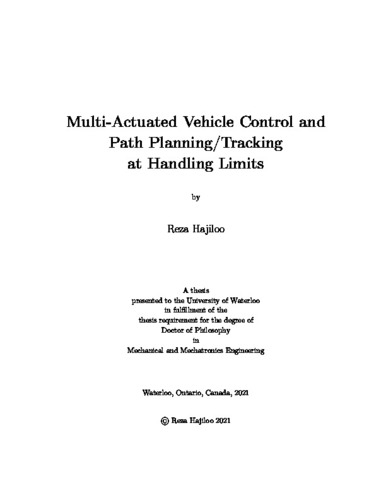| dc.contributor.author | Hajiloo, Reza | |
| dc.date.accessioned | 2021-03-10 14:34:50 (GMT) | |
| dc.date.available | 2021-03-10 14:34:50 (GMT) | |
| dc.date.issued | 2021-03-10 | |
| dc.date.submitted | 2021-03-05 | |
| dc.identifier.uri | http://hdl.handle.net/10012/16845 | |
| dc.description.abstract | The increasing requirements for vehicle safety along with the impressive progress in vehicle actuation technologies have motivated manufacturers to equip vehicles with multiple control actuations that enhance handling and stability. Moreover, multiple control objectives arise in vehicle dynamics control problems, such as yaw rate control and rollover prevention, therefore, vehicle control problems can be defined as multi-actuation multi-objective vehicle control problems.
Recently, the importance of integrating vehicle control systems has been highlighted in the literature. This integration allows us to prevent the potential conflicting control commands that could be generated by individual controllers. Existing studies on multi-actuated vehicle control offer a coordinated control design that shares the required control effort between the actuations. However, they mostly lack an appropriate strategy for considering the differences among vehicle actuations in their energy usage, capabilities, and effectiveness in any given vehicle states. Therefore, it is very important to develop a cost-performance strategy for optimally controlling multi-actuated vehicles.
In this thesis, a prioritization model predictive control design is proposed for multi-actuated vehicles with multiple control objectives. The designed controller prioritizes the control actuations and control objectives based on, respectively, their advantages and their importance, and then combines the priorities such that a low priority actuation will not kick in unless a high priority objective demands it. The proposed controller is employed for several actuations, including electronic limited slip differential (ELSD), front/rear torque shifting, and differential braking. In this design, differential braking is engaged only when it is necessary, thus limiting or avoiding its disadvantages such as speed reduction and maintenance.
In addition, the proposed control design includes a detailed analysis of the above-mentioned actuations in terms of modelling, control, and constraints. A new vehicle prediction model is designed for integrated lateral and roll dynamics that considers the force coupling effect and allows for the optimal control of front/rear torque distribution. The existing methods for ELSD control may result in chattering or unwanted oversteering yaw moments. To resolve this problem, a dynamic model is first designed for the ELSD clutch to properly estimate the clutch torque. This ELSD model is then used to design an intelligent ELSD controller that resolves the issues mentioned above.
Experimental tests with two different vehicles are also carried out to evaluate the performance of the prioritization MPC controller in real-time. The results verify the capability of the controller in properly activating the control actuations with the designed priorities to improve vehicle handling and stability in different driving maneuvers. In addition, the test results confirm the performance of the designed ELSD model in ELSD clutch torque estimation and in enabling the controller to prevent unwanted oversteering yaw moments.
The designed stability controller is extended to use for emergency collision avoidance in autonomous vehicles. This extension in fact addresses a local path planning/tracking problem with control objectives prioritized as: 1) collision avoidance, 2) vehicle stability, and 3) tracking the desired path. The controller combines a conservative form of torque/brake vectoring with front steering to improve the lateral agility and responsiveness of the vehicle in emergency collision avoidance scenarios. In addition, a contingency MPC controller is designed with two parallel prediction horizons - a nominal horizon and a contingency horizon - to maintain avoidance in identified road condition uncertainties.
The performance of the model predictive controllers is evaluated in software simulations with high fidelity CarSim models, in which different sets of actuation configurations in various driving and road conditions are assessed. In addition, the effectiveness of the local path planning/tracking controller is evaluated in several emergency and contingency collision avoidance scenarios. | en |
| dc.language.iso | en | en |
| dc.publisher | University of Waterloo | en |
| dc.subject | autonomous vehicles | en |
| dc.subject | actuator dynamics | en |
| dc.subject | collision avoidance | en |
| dc.subject | contingency controller | en |
| dc.subject | control action prioritization | en |
| dc.subject | differential braking | en |
| dc.subject | electronic limited slip differential | en |
| dc.subject | ELSD | en |
| dc.subject | front/rear torque distribution | en |
| dc.subject | handling limits | en |
| dc.subject | lateral agility | en |
| dc.subject | model predictive control | en |
| dc.subject | MPC | en |
| dc.subject | multi-actuated vehicle | en |
| dc.subject | path planning | en |
| dc.subject | path tracking | en |
| dc.subject | prioritization MPC | en |
| dc.subject | road angle | en |
| dc.subject | roll stability | en |
| dc.subject | stability control | en |
| dc.subject | tire force coupling | en |
| dc.subject | vehicle handling performance | en |
| dc.subject | vehicle stability control | en |
| dc.title | Multi-Actuated Vehicle Control and Path Planning/Tracking at Handling Limits | en |
| dc.type | Doctoral Thesis | en |
| dc.pending | false | |
| uws-etd.degree.department | Mechanical and Mechatronics Engineering | en |
| uws-etd.degree.discipline | Mechanical Engineering | en |
| uws-etd.degree.grantor | University of Waterloo | en |
| uws-etd.degree | Doctor of Philosophy | en |
| uws-etd.embargo.terms | 0 | en |
| uws.contributor.advisor | Khajepour, Amir | |
| uws.contributor.advisor | Kasaiezadeh Mahabadi, Seyed Alireza | |
| uws.contributor.affiliation1 | Faculty of Engineering | en |
| uws.published.city | Waterloo | en |
| uws.published.country | Canada | en |
| uws.published.province | Ontario | en |
| uws.typeOfResource | Text | en |
| uws.peerReviewStatus | Unreviewed | en |
| uws.scholarLevel | Graduate | en |

